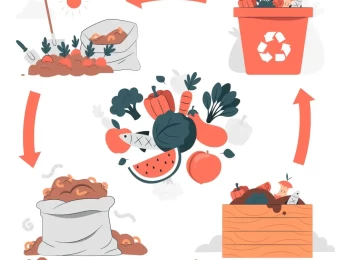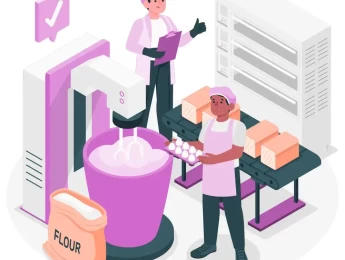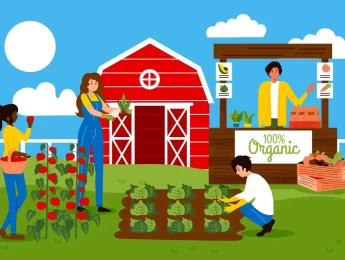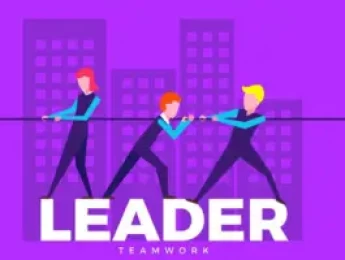The food sector has transformed in recent years with demand for global products and competition on an international level. Managing your food supply chain to remain competitive and meet various customer demands is challenging and requires excellence in overseeing retailing and logistics, sourcing and procurement, and sustainability and innovation.
This course provides an overview of the different aspects of supply chains specific to the food sector. You will explore the agriculture sector, unique operational challenges, and methods to ensure sustainable sourcing and production. In addition, complex topics such as food insecurity, economic regeneration, and the future of food supply will be explored.
Upon completion of this course, participants will be able to:
- Describe core aspects of food supply chains from management, social, and regulatory perspectives.
- Understand the structure of food supply chains, from starting points on farms to consumer tables and the process of ensuring a safe, consistent, and sustainable food supply.
- Identify challenges at different points along the food supply chain and strategies and technologies to mitigate those issues.
- Comprehend the structure and unique factors of global food supply chains.
- Describe risk management strategies specific to the food sector.
- Examine future trends in food retailing, security, and infrastructure development.
This course is intended for:
- Professionals in the Food Sector
- Supply Chain professionals
- Food Scientists
- Food Safety Consultants
This course uses a variety of adult learning styles to aid complete understanding and comprehension. Participants will review case studies to highlight key areas of importance and possible areas for faults. They will be supplied with the best tools required for learning exercises to improve their skills. Participants will analyse the examples to thoroughly understand how these skills, techniques and methods apply in the workplace.
Day 5 of each course is reserved for a Q&A session, which may occur off-site. For 10-day courses, this also applies to day 10
Section 1: Food Production and Processing
- Describe the agriculture supply chain.
- Discuss the role of agricultural development in poverty alleviation.
- Identify barriers to development in the agriculture industry.
- Examine future trends in the agriculture sector.
- Review real-world case studies.
- Outline the importance and methods of food processing and packaging.
- Discuss inventory management and procurement in the agriculture sector.
- Summarise the impact of changing market conditions.
- Describe food safety measures.
Section 2: Operational Challenges in Retailing and Logistics
- Describe the retail food environment.
- Discuss online grocery retailing and its impact on production and markets.
- Identify future challenges in food retailing.
- Diagram the movement of food and how it reaches customers.
- Examine the role of Information and Communications Technology (ICT) in the food sector.
- Review the logistics of packaging.
- Outline the structure and challenges of temperature-controlled supply chains.
Section 3: Global Food Supply Chains
- Summarise the structure of global food supply chains.
- Identify factors that affect global food supply chains.
- Discuss global food governance.
- Review current trends and relationship models in food supply chains.
Section 4: Food Sourcing and Procurement
- Describe food sourcing and sourcing models.
- Outline food purchasing models.
- Elaborate on the impacts of supplier development and segmentation on food supply chains.
- Discuss strategic sourcing and sustainable procurement in the food sector.
Section 5: Managing Risk
- Review the principles of risk management and uncertainty.
- Identify risks in food supply chains.
- Describe strategies to manage risk in food supply chains.
Section 6: Trends in Food Technology
- Discuss the importance of traceability and available technological tools.
- Outline food production, processing, and packaging technologies.
- Review tools to manage food logistics.
Section 7: Sustainability and Future Challenges
- Identify factors to consider in designing food supply chains.
- Discuss food laws and regulations and their impact on safety.
- Describe the types of food standards: reference, compatibility, and private.
- Examine sustainability in food supply chains and how to develop sustainable chains.
- List sustainability measurement techniques.
Section 8: Innovation and Economic Regeneration
- Describe innovation methods and systems in the food supply chain.
- Explore food product development and innovations.
- Examine infrastructure development and food hubs in the food sector.
- Outline the impact of moving up the food value chain.
Section 9: Future Challenges and Food Security
- Define food security and identify change agents that affect food security.
- Outline the factors impacting the future of the food supply chain.
- Discuss strategies and challenges in balancing demand and supply sustainably.
Upon successful completion of this training course, delegates will be awarded a Holistique Training Certificate of Completion. For those who attend and complete the online training course, a Holistique Training e-Certificate will be provided.
Holistique Training Certificates are accredited by the British Assessment Council (BAC) and The CPD Certification Service (CPD), and are certified under ISO 9001, ISO 21001, and ISO 29993 standards.
CPD credits for this course are granted by our Certificates and will be reflected on the Holistique Training Certificate of Completion. In accordance with the standards of The CPD Certification Service, one CPD credit is awarded per hour of course attendance. A maximum of 50 CPD credits can be claimed for any single course we currently offer.
- Course Code PO1-115
- Course Format Classroom, Online,
- Duration 5 days














